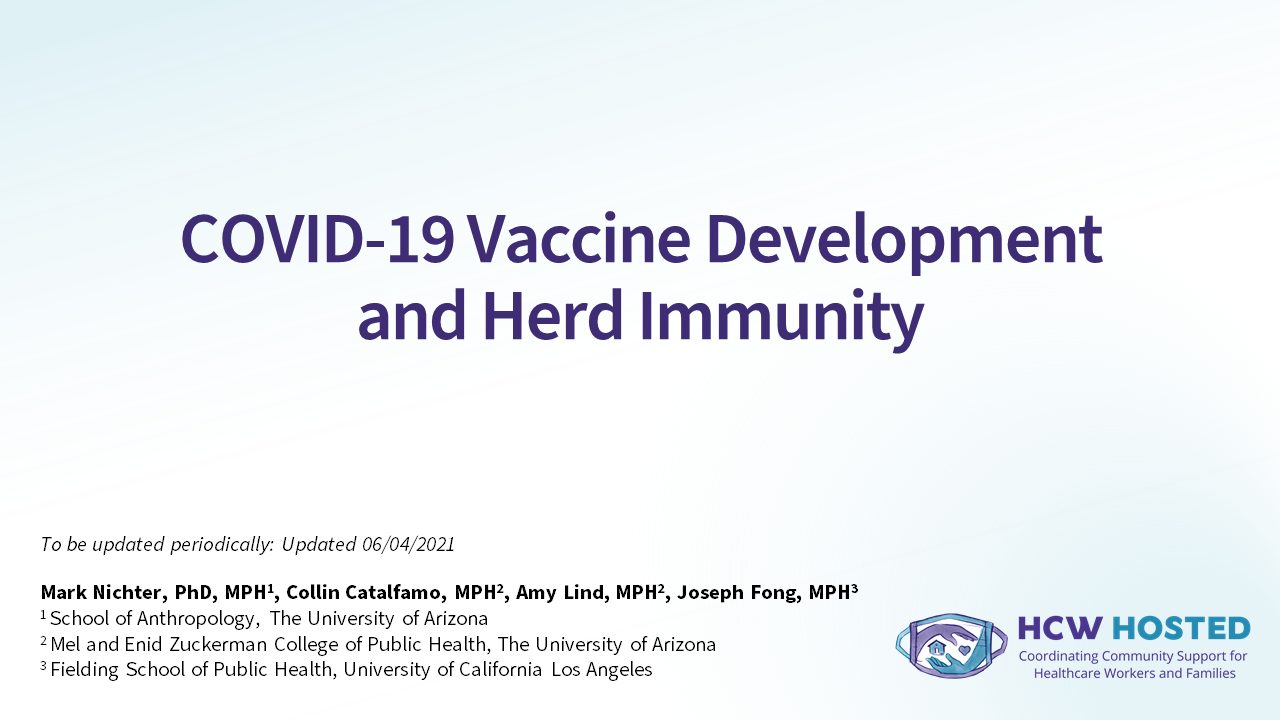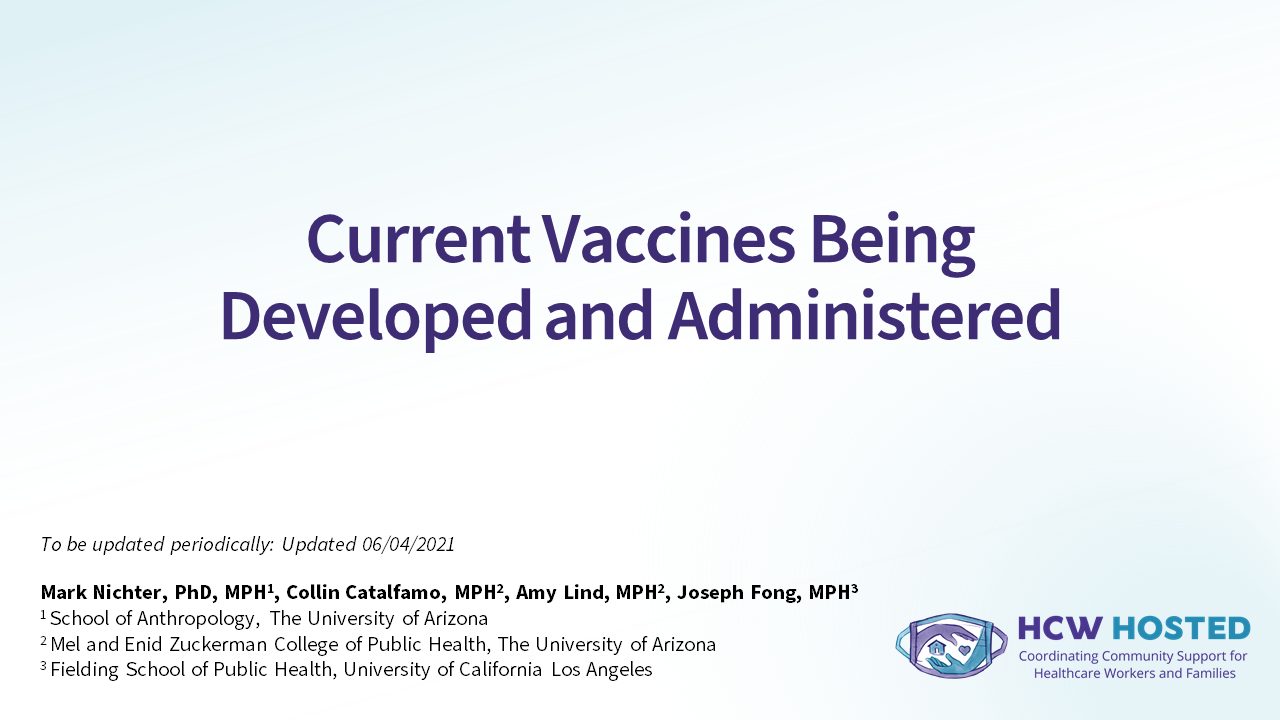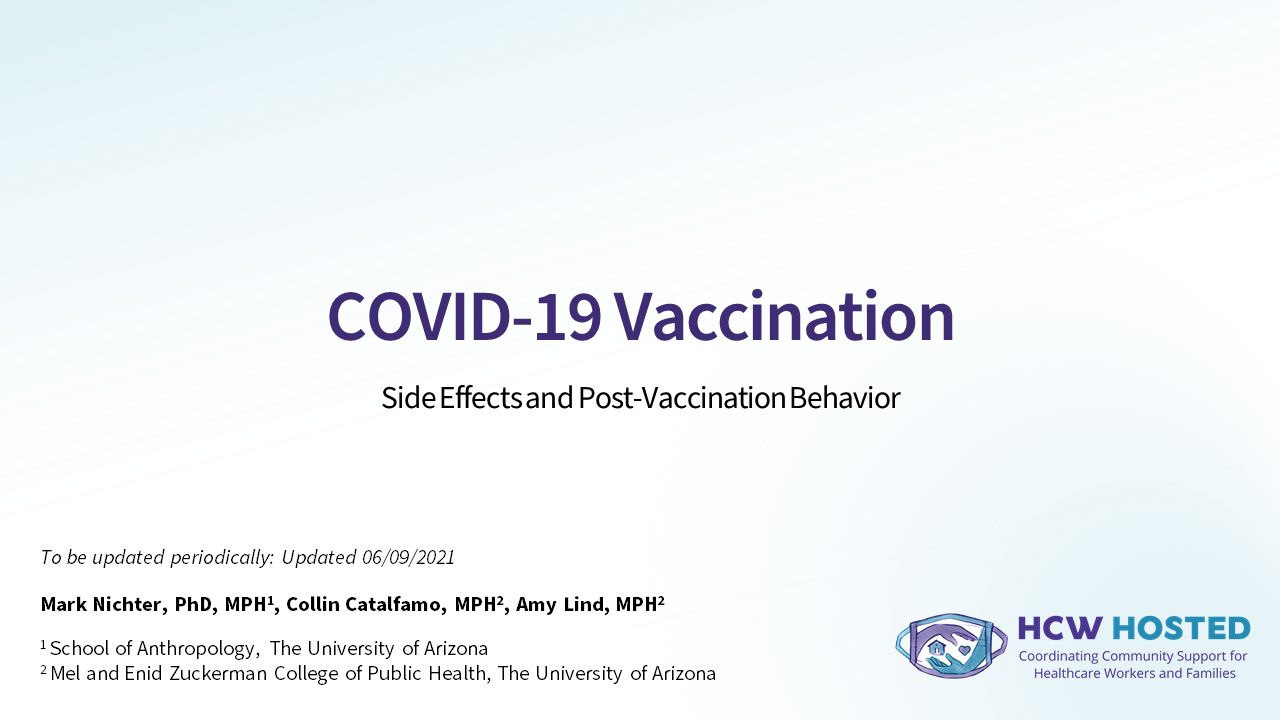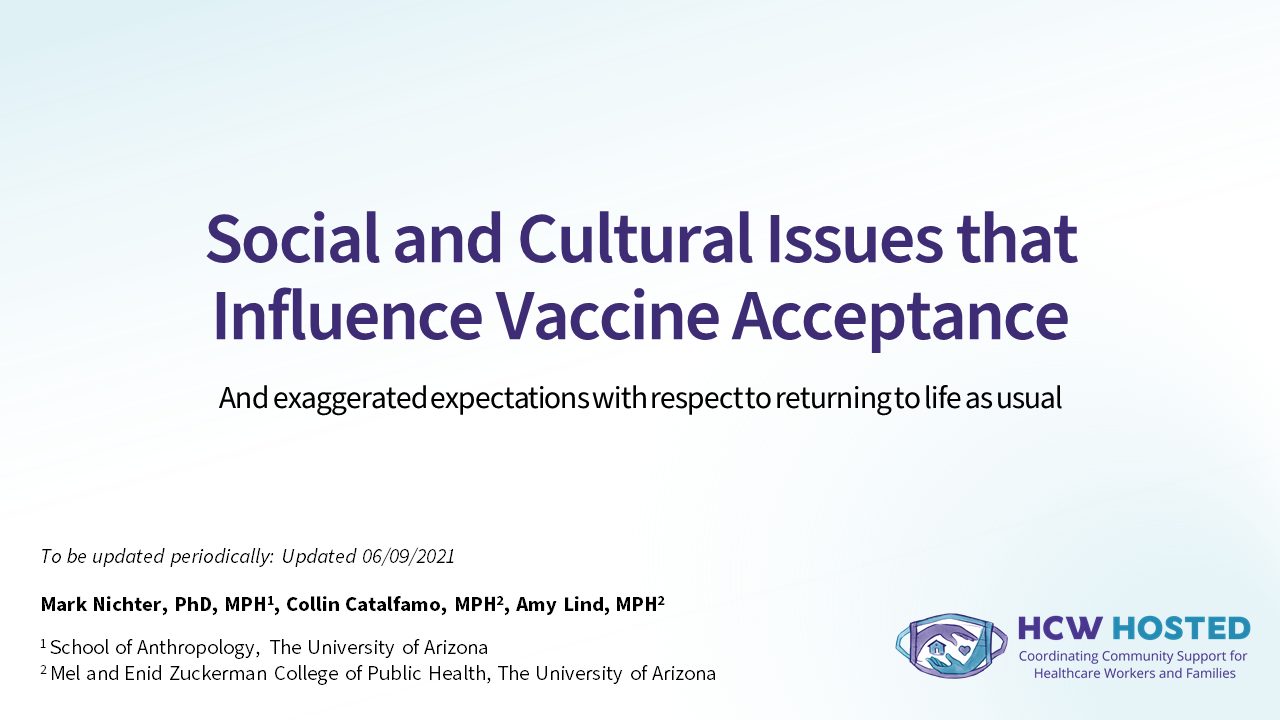Last updated by our Medical Anthropology & Epidemiology Team on 06.09.2021
The Goal of COVID-19 Vaccine Development
Vaccines help the body’s immune system recognize and respond to diseases. This can prevent illness and/or reduce severity of illness for those who are vaccinated.
Vaccines are one of public health’s most effective disease prevention methods. The degree to which a vaccine prevents disease in a controlled lab environment is called Vaccine Efficacy. This is not the same as Vaccine Effectiveness, which determines how well a vaccine prevents disease in a real-life population.To be effective, vaccines must have high uptake in the community (i.e. the community must actually receive the vaccination).
Though vaccines normally take 10-15 years to develop, the COVID-19 vaccines have been created much faster as part of Operation Warp Speed. This does not mean the COVID-19 vaccines are unsafe or not properly tested, though.
The primary goal of COVID-19 vaccinations is to prevent serious symptoms in susceptible populations, preventing the need for hospitalization and reducing deaths due to COVID-19; this protects the most vulnerable in our population and ensures our hospitals are not overloaded.
The secondary goal of COVID-19 vaccinations is to prevent infection altogether; this requires reaching herd immunity. Herd immunity is only possible if a large portion of the population is vaccinated, and the pandemic will not immediately end with the advent of COVID-19 vaccines.
Current Vaccines Being Developed & Administered
Several different types of COVID-19 vaccines have been developed since the beginning of the pandemic. The first to seek approval from the FDA were “genetic-based” vaccines by Pfizer and Moderna. Both of these vaccines have shown greater than 90% effectiveness in preventing COVID-19 symptoms, and produce few, short-lived side effects in vaccinated individuals.
COVID-19 vaccines are NOT immediately effective because your body needs time to build up its immune response. Two weeks after dose #1, the Pfizer and Moderna vaccines have approximately 52% effectiveness; two weeks after dose #2, these vaccines reach approximately 95% effectiveness.
Since the vaccine protects primarily against symptoms, it may be possible to contract asymptomatic COVID-19 after vaccination and pass it on to others around you without realizing it. This is why masking and social distancing are still recommended for vaccinated individuals in indoor spaces, particularly around those who are high risk (young children who cannot be vaccinated and those who are at risk of severe disease or are immune compromised).
The AstraZeneca and Johnson & Johnson COVID-19 vaccines are different from the Pfizer and Moderna vaccines and have raised some concern about blood clots as a side effect. However, the Advisory Committee on Immunization Practices (ACIP) has reviewed safety data for the Johnson & Johnson vaccine and has determined it is still safe for use in the U.S. The Pfizer and Moderna vaccines have not been associated with blood clots or other severe side effects.When administered as directed, these vaccines are very useful for preventing illness and disease with SARS-CoV-2.
Initially, the Pfizer and Moderna vaccines were not available to minors but have since been given emergency approval by the FDA for children ages 12 and up.
COVID-19 Vaccine Acceptance and Hesistancy
Vaccine hesitancy is often caused when communities have low trust in the government or in the companies that created the vaccine, or when the community is concerned about if the vaccine is safe. When people know a vaccine is very effective, they are more likely to get vaccinated.
Minority populations have been largely underrepresented in vaccine studies, and have tragically been racially discriminated against by medical research communities in the past (e.g. the Tuskegee Study). This historical context feeds into modern-day mistrust and discord between minority communities and medical research. People are more likely to get vaccinated if someone they perceive as trustworthy recommends it.
However, one area that has shown to be concerning among those hesitant to receive the vaccinations has been vaccine side-effects. Vaccine side effects are an indication that your immune system is responding well to the vaccine and should not be cause for alarm. Severe reactions to the vaccine (such as anaphylaxis) are extremely uncommon for people who do not already have life-threatening allergies.
Even if these minorly inconveniencing side-effects seem enough to put off vaccination, remember: some people cannot be vaccinated because of underlying health conditions, so others around them should become vaccinated. This reduces the chance that people who cannot get vaccinated will encounter a disease and become severely ill.
More Information
If you have questions about what you can do once you are vaccinated, you can also review our blog post What Can I Do Now That I’m Vaccinated? If you have questions about what to expect immediately after your vaccination, you can download our Now That You’re Vaccinated infographic in Spanish or English.
For more detailed information regarding Vaccine Development and Herd Immunity, Current Vaccines Being Developed and Administered, Side Effects and Post-Vaccination Behavior, or Social and Cultural Issues that Influence Vaccine Acceptance you can read our summaries of the latest vaccine research and news (presentations will open in a new window or tab) or view our responses to frequently asked questions below.
How good is the protection offered by COVID-19 vaccines?
The evidence so far suggests that two full doses of the Pfizer and Moderna vaccine or one does of the Johnson & Johnson vaccine — with the appropriate 14 day waiting period after the second shot — effectively eliminates the risk of COVID-19 death, nearly eliminates the risk of hospitalization due to COVID-19, and drastically reduces a person’s ability to infect somebody else with the virus.
If I get the COVID vaccine, am I still at risk of getting COVID?
Two weeks after your second shot of the Pfizer or Moderna vaccines, you have a very low risk of contracting symptomatic COVID-19. In clinical trials, only 3-5% of the vaccinated group did get infected with mild disease.
Does the vaccine protect you against all COVID illness or just severe disease?
COVID-19 vaccines protect you against symptomatic COVID-19 illness. All COVID-19 vaccines are highly effective at preventing severe illness, hospitalizations, and death. If you were among the small percentage of those who contract COVID-19 after full vaccination, evidence suggests that it would likely be a mild infection.
Can a person who is vaccinated still spread COVID-19 to others?
COVID-19 vaccination greatly reduces your chances of transmitting the disease to others, but transmission is still possible for two reasons.
First, during clinical trials, 3-5% of the vaccinated group got infected with mild disease. Even though this percentage is low, it amounts to a rather large number when seen nationally. The US adult population is composed of approximately 328 million people, and a 3-5% infection rate equals 9,840,000-16,400,000 people able to contract mild COVID-19 after vaccination. Each of these infected persons may infect several others.
Second, we still do not know how many people may experience an asymptomatic infection and shed the virus while breathing.
For these two reasons, until most of the population is vaccinated, it is important that we all continue to wear masks and practice physical distancing. This is especially true around the elderly, immunocompromised, and those at high risk for severe COVID disease (those with obesity, diabetes, and lung diseases), as well as unvaccinated members of your extended family and friends.
Is it necessary to get tested after being fully vaccinated?
Because the vaccines are not 100% effective, you should get tested if you have symptoms of COVID-19, even after you are fully vaccinated.
How can I know that the vaccination worked? Should I get a test to find out
The CDC discourages testing for assessing immunity after getting the vaccine.
Serological tests are designed to estimate the percentage of the population previously infected with the virus by measuring the amount of antibodies you have circulating in your blood. However, these will not tell you definitively if you will mount an effective immune response after being vaccinated because antibodies are only part of a person’s immune system response.
People who test negative on the antibody test 14 days after completing their vaccine shots may still mount an effective immune response when exposed to the virus.
Will getting the vaccine make diagnostic COVID-19 testing less accurate because you already have antibodies?
No, being vaccinated will not impact COVID-19 diagnostic tests (PCR or antigen) since those look for active COVID-19 infection only and not antibodies.
Do I need to get vaccinated if I have already had COVID-19?
Yes, it is recommended that everyone get a vaccine. Vaccination is necessary to ensure that a protective immune response is mounted. Those with prior asymptomatic and mild cases might not have mounted the same level of immune response as they will after vaccination. Infection-acquired immunity may also be more variant specific, being less robust than vaccine-acquired immunity.
If I have tested positive but did not have COVID-19 symptoms, do I need to get vaccinated?
Yes. Vaccination is necessary to ensure that a protective immune response is mounted. Those with prior asymptomatic and mild cases might not have mounted the same level of immune response as they will after vaccination.
How long do I have to wait after testing positive before getting vaccinated?
Per the CDC, people with COVID-19 who have symptoms should wait to be vaccinated until they have recovered from their illness and have met the criteria for discontinuing isolation; those without symptoms should also wait until they meet the criteria before getting vaccinated. This guidance also applies to people who get COVID-19 before getting their second dose of vaccine. If you had severe disease resulting in hospitalization, talk to your healthcare provider about when you should be vaccinated.
If I previously tested positive, do I need one dose of the vaccine or two, given that I am already producing antibodies?
Both Pfizer and Moderna vaccines require two doses, regardless of a prior infection.
Is one dose of Pfizer or Moderna vaccine enough?
It is best to receive two doses of vaccine. A single dose of vaccine yields a 52% effectiveness rate, but receiving two doses (in their appropriate timeframe) yields a 95% effectiveness rate.
Do I need to get the vaccine if I live with someone who had COVID, and I did not get ill? Wouldn’t just being around them immunize me?
Yes, everyone should be vaccinated against COVID-19. Living with someone who had COVID-19 does not mean you have developed an immune response to the virus. Widespread vaccination will ensure that as many people are immune as possible.
Do the antibodies you produce from the vaccination differ from the antibodies your body produces when infected? If different, which is more powerful and long-lasting?
The antibody response is the same, but the level of immune response that arises from COVID disease can be more variable than that produced by the vaccine. While we still don’t have enough long-term data to show which is more powerful and long-lasting, immunologists believe durability in antibody response after full vaccination will be longer for many people than durability in antibody response after COVID-19 infection. Infection-acquired immunity may also be more variant specific, being less robust than vaccine-acquired immunity.
How long will the protective effect of the vaccine last?
Although the long-term data is not yet in, immunologists that have been studying the antibody response for nearly a year now believe that full vaccination will provide protection for a period of at least 210 days, and perhaps much longer.
Are the side effects different for Pfizer vs. Moderna vaccines? Which has more severe side effects?
Both vaccines have similar side effects. The most common side effects are injection site pain and rash, fatigue, headache, muscle pain, and joint pain. Some people in the clinical trials have reported fever. Side effects are more common after the second dose, and younger adults, who tend to have more robust immune systems, reported more side effects than older adults. Mild to moderate side effects from getting vaccinated generally subside after 48 hours and be treated with acetaminophen (Tylenol etc.). Skin rashes may persist longer and can be treated with over the counter antihistamines.
I hear the side effects are greater for the second dose. Does it make sense to wait till I get the second dose if I had bad side effects with the first dose? Will waiting make the side effects be less severe?
No, you should get your second dose at the recommended time. In addition, side effects are viewed as a good sign, as they are evidence that your immune system is building an immune response to the virus.
Are women more likely to suffer side effects from COVID -19 vaccinations than men?
Yes: The immune system of women is more robust that of men. For this reason, side effects tend to be somewhat more common. Side effects generally last 1-3 days. The good news is that the protective effect of the vaccination may also be greater.
If you do not experience side effects after receiving a vaccination, how do you know it is working?
Many individuals will not have any side effects following vaccination, but that doesn’t mean they are not protected. Whether or not you experience side effects or not, you can rest assured that both vaccines are offering a high level of protection against COVID-19.
Which vaccine is better for elders?
So far, there is no difference between the two vaccines among different age groups.
Do I need to get the vaccine if I already got a flu shot?
Yes. The COVID-19 vaccine provides protection against the COVID-19 virus, which is different from the flu virus. You should wait 14 days between a flu shot and the COVID vaccine
Do I still need to wear a mask after being vaccinated?
Yes, we all will need to remain vigilant with mask wearing in public until the majority of our population is vaccinated and COVID-19 transmission is low. Mask wearing is particularly important when we are in contact with the elderly who are yet to be vaccinated, those at high risk for a poor outcome if infected (immunocompromised and with comorbidities like obesity, diabetes, lung diseases), and those who are not yet vaccinated and outside your social bubble.
If I have to wear a mask, is it to protect me or to protect others?
Both. Since the vaccines are efficacious in 95-97% of the vaccinated population, there is still a chance that a person who is vaccinated can get infected and pass on the disease. This risk will be further reduced as more of our population gets vaccinated. While we wait for most of our population to be vaccinated, we must continue to protect those that are still waiting to receive their vaccine.
Do the vaccines available now protect against the variants I hear about in the news ?
It is possible that a booster to novel variants will be needed in the future; however, our best defense against these variants is for more people to be vaccinated with the current vaccines as quickly as possible. You should get vaccinated as soon as you are eligible.
If I am exposed to someone who tests positive for COVID-19 after I have been vaccinated, do I still have to quarantine?
According to recent CDC guidelines, you are not required to quarantine if and only if you have met the following criteria:
- More than two weeks have passed following receipt of your last dose of COVID-19 vaccine.
- Less than three months have passed following receipt of your last dose in the COVID-19 vaccine series.
- You have remained asymptomatic since the exposure.
If you have not met these criteria you do have to quarantine and be tested.
How long does it take the first vaccine to become effective?
Vaccine acquired immunity is not immediate. It takes about two weeks for your first vaccination to offer you 50% immunity, and another 14 days after your second shot to reach >90% immunity.
Can I get a mild case of COVID-19 from being vaccinated and past that on to family members?
There is no live virus in the vaccine, so you can’t get COVID from getting vaccinated.
Should I take Tylenol or Advil before getting the vaccination if there are likely to be side effects?
You should avoid taking pain relievers before your shot because these pain relievers may reduce the immediate effectiveness of the vaccination. It is OK to take acetaminophen (Tylenol) or a nonsteroidal anti-inflammatory drug (NSAID) like Advil or Motrin after your vaccine to treat side effects such as pain, fever, chills, or headache.
I experienced a very uncomfortable rash on the arm where I received my first vaccination. Should I get the second dose of that same vaccine, or consider a different vaccine?
Getting a rash a few days after getting the vaccine is a mild allergic reaction, which although uncomfortable, is no reason to not get the second dose of the same vaccine. The CDC has not found a rash on your arm to place you at risk for a severe allergic reaction when you get your second dose. Should it reoccur, treat the rash with an over-the-counter antihistamine like Benadryl and get your second vaccine shot in your other arm.
How long should I wait before contacting my health care provider if I experience symptoms after getting vaccinated? What if the symptoms occur days after taking the vaccination and not just right away?
You can still contract COVID-19 illness during the 14 days it takes for the vaccine to become effective. Since a vaccine will not cure an existing case of COVID-19, you could already have virus on day you got vaccinated. For this reason, if your symptoms persist, you should take a COVID-19 test.
Cough, shortness-of-breath, runny nose, sore throat, and loss of taste or smell are unlikely to be side effects of the vaccine. If you experience these symptoms, get tested for COVID.
If side effects continue for more than 2-3 days, consult your healthcare provider.
If I have a mild or asymptomatic case of COVID-19, will the vaccine cure the disease or prevent it from becoming severe?
No – vaccinations are not treatments for illness. They are not designed to reduce the severity of a disease, but rather to protect you from getting it the first place.
If I’m pregnant or breastfeeding, should I still get the vaccine?
mRNA COVID-19 vaccines (specifically, from Pfizer/BioNTech and Moderna), are likely safer because they do NOT use live viruses or ingredients that induce an immune response. Further, the Society for Maternal-Fetal Medicine indicates that health risk of mRNA COVID-19 vaccines may be low, and recommends the vaccines be offered to pregnant women.
Can the COVID vaccine affect fertility?
There is no evidence that fertility problems are a side effect of any approved COVID-19 vaccine. People who are trying to become pregnant now or who plan to try in the future may receive the COVID-19 vaccine.
Can I get sick with the flu and COVID-19 at the same time?
Yes, it is possible to become ill with the seasonal flu and COVID-19 at the same time since they are separate viruses. For your own safety and to keep hospitals from being overwhelmed, please get both a flu vaccination and a COVID-19 vaccination. Make sure to wait 14 days after your flu vaccination before getting your COVID-19 vaccine.
How do I know if I have the flu or COVID-19?
The seasonal flu and COVID-19 have many of the same symptoms, so it is best to get tested for COVID-19 if you are unsure. Be aware that loss of taste and/or smell are symptoms specific to COVID-19; if you experience loss of taste or smell, get a COVID-19 test as soon as possible.
Does getting a flu shot make you temporarily more susceptible to COVID-19? Does the flu shot lower your immunity?
There is little scientific basis to suggest that getting a flu shot will temporarily weaken your immune system. In your everyday life, your immune system regularly encounters and reacts to multiple pathogens. It is unlikely, then, that reacting to one vaccine will put you at greater risk to infection from another pathogen.




